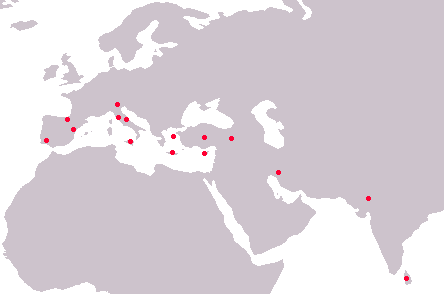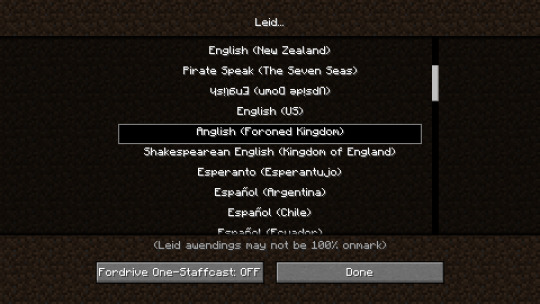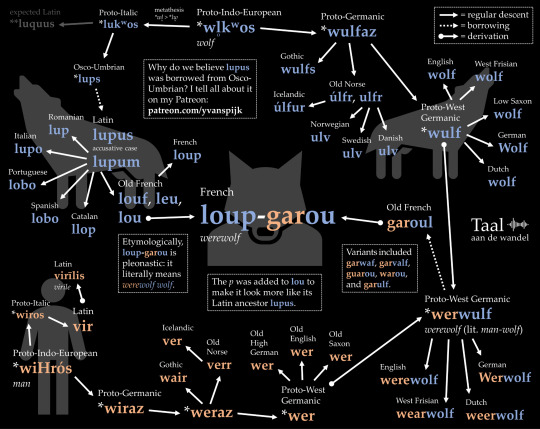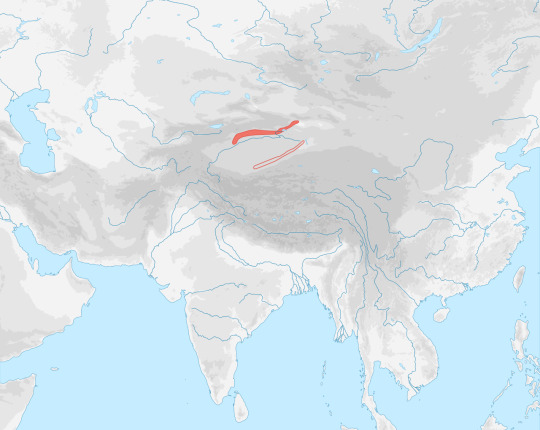#historical linguistics
Text

Duke, -duce, Herzog & ziehen
Duke comes from the Latin word dux (leader). It's related to the verb dūcere (to lead; pull), whence English -duce, for example in to seduce (whose original Latin meaning was 'to lead astray').
The second part of German Herzog (duke) is cognate to dux. This part, -zog, is related to the German verb ziehen (to pull), cognate of dūcere.
Old English had cognates of both words. Its counterpart of Herzog was heretoga (army leader). In Middle English it became heretowe, which would've become modern *hartow. The Old English cognate of ziehen was tēon. This verb would've become *to tee if it had continued to exist. See the infographic for information about its past tense and past participle.
#historical linguistics#linguistics#language#etymology#english#latin#french#dutch#german#spanish#old english#old french#old dutch#old saxon#low saxon#old high german#old frisian#frisian#romanian#catalan#portuguese#greek#venetian#gothic#lingblr
36 notes
·
View notes
Note
Do you have any thoughts on the translation scene in Goncharov? I haven't seen a lot of people talking about it but it's a pretty pivotal scene and given that what they're doing is not dissimilar to a conlang imo i figured you might have some good insights
*sigh*
I figured someone was going to ask this eventually...
So listen, the whole translation scene in Goncharov is not technically conlang-related. It's actually even more brilliant, but it's hard to explain.
Since the tutor doesn't speak Russian and the nurse only speaks Italian, the aphasiac Soviet spy has to use an impromptu series of hand gestures to indicate that he either does or doesn't understand. I mean, you can glean that from the subtitles, so that's no big revelation.
But this is where it gets weird and...I mean, linguistically controversial, to say the least, but it was the 70s.
As the tutor and the nurse attempt to communicate with him and each other, they begin to winnow down their vocabulary to words that are cognate between Italian and Russian. And through this back and forth, the languages seem like they're blending, but what they're actually doing is reversing the sound changes of Italian and Russian until they both end up, improbably, at Proto-Indo-European. It's like something you'd see in Fantasia, but aural! It's...utterly bizarre.
And, of course the final word that the nurse and the tutor utter simultaneously, the one that brings the spy to tears, is *bʰewdʰ- "awake, aware"—which, I mean, knowing how the rest of the movie goes...yeah. Bombshell. And it's crazy to me that they didn't subtitle it! Like, you pretty much have to be a PIE scholar to get that, and the entire subplot hinges on it! I mean, bold isn't the word for it. Unfathomable. Cannot believe they got away with that...
Rumor has it that Morris Halle consulted on the film, but he's adamantly refused to talk about. (For years, he'd end all his guest lectures with, "Are they any questions about anything other than Goncharov?") He never once confirmed whether or not he was involved (of course, he wasn't credited, but that wouldn't be unusual for the time even if he was involved).
I can see why you'd think it would be a conlang, but the reverse-engineered sound changes were so precise, and the whole thing so by the book, that there really wasn't any actual invention. It was all Indo-European!
#goncharov#conlang#language#pie#indo-european#proto-indo-european#film#linguistics#morris halle#language evolution#historical linguistics
3K notes
·
View notes
Text

#im dying bro im fuckin dying i remembered how much i love proto germanic and then i thought abt all the langs#that came before PIE .....#.chatter#historical linguistics
284 notes
·
View notes
Text
Paleo-European languages
Before the Celtic and Germanic languages, before Latin and Greek, before any Indo-European languages whatsoever, Europe was populated by speakers of dozens if not hundreds of languages, most of which left little or no trace. These are called Paleo-European languages.

The only known surviving Paleo-European language is Basque, but we have ancient written inscriptions from a number of others, such as Aquitanian, Etruscan, Iberian, Minoan, and Tartessian.

Roman writing with ancient Basque names, found in Lerga, Navarre.
There are also traces of other lost Paleo-European languages in many place names and borrowings from those languages into the Indo-European languages that came later. Moreover, the Paleo-European languages influenced the grammar and pronunciation of the Indo-European languages, sometimes creating a new branch of Indo-European entirely.
When a language influences the language that replaces it like this, it is called a substrate language. It is hypothesized that the development of the Germanic languages was caused by such a substrate, which gave the Germanic languages about a quarter of their vocabulary.
More broadly, any language that was displaced or existed in Prehistoric Europe, Asia Minor, Ancient Iran, and Southern Asia before the arrival of the Indo-Europeans is called a Pre-Indo-European language. More of these are attested or recognized as substrates than for Paleo-European, but little is known about them overall.

Known Pre-Indo-European languages
Want to learn more about the history of the world’s languages? I recommend one of my favorite pop linguistics books, Empires of the word: A language history of the world:

356 notes
·
View notes
Text
Review of The Horse, the Wheel, and Language: How Bronze-Age Riders from the Eurasian Steppes Shaped the Modern World by David W. Anthony

I will be upfront, it is a very technical book. If you are not well versed in the anthropological categorizing of cultures and time periods of the areas being discussed it can be very difficult to keep up with the more finite points the author is making. That being said, I had never heard of any of the specific cultures being discussed in the Danube Valley and was still able to enjoy this book and its well put together analysis of various aspects of language, culture, technological developments and shifts in behaviors and place.
If you are especially interested in any of the major themes this book discusses (which is in all honesty is an extensive list including but not limited to; the development of Indo-European language, the time periods and locations as well as likely motivation for domestication of various livestock types, the cultural effects of technological developments on the peoples of the Eurasian Steppes and their migration/trading patterns) I do highly recommend. It is heavy reading but extremely illuminating.
#The horse the wheel and language#David W Anthony#historical anthropology#anthropologist#anthropology#ancient languages#language#historical linguistics#linguistics#proto indo european#indo european#steppes#eurasian#eurasian steppe#horse#horses#husbandry#burials#Cattle#sheep#book review
158 notes
·
View notes
Text

The #ConnectedAtBirth #etymology of the week is SKI/SCIENCE/SHODDY #ski #science #shoddy
#ski#skiing#science#shoddy#etymology#wotd#connectedatbirth#words#language#linguistics#word nerd#wordnerd#history of the english language#history of english#historical linguistics#lingcomm#lingblr
81 notes
·
View notes
Text
Oh well huh, speaking of substrates and Egyptian etc.: here's a brand new article proposing a former Afrasian branch in the Balkans, substratal to Proto-Indo-European
and yes this does at least sound like it would work better than trying to make PIE and PSem neighbors, or projecting binary Semitic–IE comparanda into Nostratic. TBD if anything more comes of this idea later on…
90 notes
·
View notes
Text
Anglish is such a fascinating concept…
…and I learned about it because of Minecraft.

77 notes
·
View notes
Text
Once upon a time I wanted to be a historical linguist. I used to say it was because the more abstract and useless something is the more I like it.
For me language is a unifying interest. I have never been able to ignore the words pushing softly against my ear drums. I didn't know it was possible to sit in a room where people were speaking and not absorb them, not have those gentle waves resonate through the electric pathways of your mind into the fibers of your muscles, humming your bones from head to toe.
When I fell in love with reading as a six year-old child, I didn't fall in love with stories. Perhaps because I don't visualize stories when I read. I only discovered other people do that last year. At the age of 54. When I read I visualize words and hear the sounds. And in turn, when I hear words, somewhere in the back of my brain there's a visual image attached to them, a dim contoured shape, a pattern of faded symbols, visible music. When I fell in love with reading as a six-year old child, I fell in love with the shape of words.
When I write words I bring out old friends and treasured companions, each with a personality, a quirk, a history, a network of memories, some we share and some that are only mine, memories of intimate, life-changing moments my friends and I spent together, alone.
But words could never be my only interest. The lack of novelty prohibits it. I suppose modern academia was never a place I could live.
The beauty of historical linguistics is that it is not just words, not just the family histories of my closest friends, not just my nation's history the history of my ancestors, the history of the world, but it is also math. Or more precisely, a logic puzzle. Which math is also.
You see, I love puzzles, and how things came to be how they are is the greatest of them all. It connects astrophysics to geology to biology to archaeology to history to genealogy. It is all one creation story in mystery form, one in which the subplot about language forms my favorite thread.
I am interested in many things, but sometimes I see that they are all really one thing, a single glorious feast, in which words and their stories are the final champagne.
26 notes
·
View notes
Text
What is the Most Natural Development Principle? (Linguistic Tidbits #2)
Introduction
Hey there! Today, I’ll be talking about one of the most important concepts in language evolution: the Most Natural Development Principle (MNDP). As conlangers, we usually try to make our conlangs naturalistic to be believable to those who encounter our langs in literature. The MNDP is a tool in our phonological evolution toolkits that is critical to the organic development of naturalistic linguistic systems. So, without further adieu let's dive into the Most Natural Development Principle!
What is the MNDP?
The Most Natural Development Principle is a set of four sound changes present in most languages. They are as follows:
The final vowel of a word may be dropped if the syllable is unstressed (Ex. metada /’mɛt.ɑd.ɑ/ becomes /’mɛt.ɑd/)
Voiceless sounds become voiced between vowels (Ex. metad /’mɛt.ɑd/ becomes medad /’mɛd.ɑd/)
Stops become fricatives (Ex. medad /’mɛd.ɑd/ becomes meðad /’mɛð.ɑd/)
Word-Final consonants become voiceless (Ex. meðad /’mɛð.ɑd/ becomes meðat /’mɛð.ɑt/)
Applying the MNDP in Conlanging
When trying to create a naturalistic conlang, sometimes it’s hard to figure out what sound changes to incorporate into our langs. I always make sure that the MNDP is one of the first sound changes to implement into my conlangs (Along with h-deletion which I wrote about in my last blog post: https://www.tumblr.com/readmypaws/721694990484520960/what-is-h-deletion-and-compensatory?source=share) It helps get the process started and it becomes much easier to think of sound changes after implementing some basic universal changes to see what happens. However, when constructing a language, consider the linguistic context, the cultural context, and the specific goals you want to achieve. Strive for consistency, and avoid artificial or arbitrary elements that may take away from the naturalistic feel of your conlang.
Conclusion
Remember, the MNDP is not a rigid set of rules that must be used in all conlangs, but rather a good sound change that helps us create conlangs that feel alive and realistic. Happy conlanging ^w^
108 notes
·
View notes
Text

The French word for a werewolf is loup-garou. Etymologically, this compound is pleonastic: garou means 'werewolf' and loup means 'wolf'. It's also hybrid: loup stems from Latin lupus whereas garou was borrowed from West Germanic *werwulf. Click the image for more.
#historical linguistics#linguistics#language#etymology#english#latin#french#old french#proto-germanic#proto-indo-european#proto-italic#proto-west germanic#lingblr#werewolf#werewolves
988 notes
·
View notes
Note
welcome back! Ages ago I think you posted a link to a dictionary of common sound changes any chance you still have that resource or something like it? need some guidance so I'm not doing something totally wacky like all my Ts becoming Qs
Got a couple things for you. The first is the Index Diachronica, which is a searchable website. It's a database of hundreds of natural language sound changes.
Second is William Annis's "Paterns of Allophony", an article on Fiat Lingua that represents visually common sound changes.
Hope you find those useful!
177 notes
·
View notes
Text
I read a fun article about how some European languages don’t use the usual Indo-European form for the word “wolf” of having either a w- or a v- word.
Instead, a lot of languages apparently are doing the same avoidance speech thing that we’re all familiar with from the word “bear” in many Germanic, Baltic, Uralic, and Slavic languages, which had a taboo on saying the real Indo-European word for “bear.” The real word is usually along the lines of ursus or artos or arktos as you find in Romance and Celtic languages.
But, in almost an exact reverse of the arktos-avoidance lineup, a lot of Romance and Celtic languages avoid the PIE *wĺ̥kʷos. Instead, Romance languages change some of the sounds, the way we change “damn” to “darn” to avoid actually saying the former. They use lupus (Latin) or lúkos (Ancient Greek). And the Celtic languages use a lot of poetical euphemisms.
So I guess in places where there weren’t a lot of bears but there were still plenty of wolves, people avoided saying the name of that top predator.
Meanwhile, all the languages from Bear Country were totally fine chatting about wolves, because who’s gonna be scared of the Big Bad Wolf when there are honest-to-God 300 kilo/600 lb genuine murder machines like bears in the fuckin woods
#bears#wolves#etymology#linguistics#language#historical linguistics#avoidance speech#avoidance register
206 notes
·
View notes
Text
Tocharian
Around 3,000 BCE, speakers of an early branch of the Indo-European languages decided to go for a little hike, and wound up all the way in South Siberia.

A few thousand years later, scholars discovered manuscripts in northwestern China dating to 500–800 CE that were shown conclusively to be written in a language from an early branch of Indo-European. They named this language Tocharian.

The discovery of Tocharian upset decades of research on ancient Indo-European languages and revitalized interested in them for two reasons:
Nobody even suspected that another branch of Indo-European existed, let alone in China’s Tarim Basin.
It was previously thought that the Indo-European languages were divided into eastern and western groups, based on whether the /k/ sound had changed to an /s/. The western languages that retained the /k/ were called centum languages (the Latin word for ‘hundred’, pronounced with an initial /k/), while the eastern languages with /s/ were called satem languages (the Avestan word for ‘hundred’). Yet Tocharian was a centum language sitting further east than almost any other language in the family. (Linguists later hypothesized that the centum-satem split wasn’t so much an east-west split as it was a spread of /s/ from the center of the language family outward, a change which didn’t reach the furthest members of the family).

Tocharian was written in a variant of Brahmi; here’s a sample of Tocharian script on a wooden tablet:

If you really want to challenge yourself, here’s a problem about Tocharian from the International Linguistics Olympiad:
#Tocharian#linguistics#language#historical linguistics#Indo-European#history#archaeology#China#Siberia#lingblr#langblr
252 notes
·
View notes
Text
Blackcrowing's Master Reading List

I have created a dropbox with pdfs I have gathered over the years, I have done my best to only allow access to documents which I found openly available through sites like JSTOR, Archive.org, or other educational resources with papers available for download.
That being said I ALSO recommend (I obviously have not read all of these but they are either in my library or I intend to add them)
📚 Celtic/Irish Pagan Books
The Morrighan: Meeting the Great Queens, Morgan Daimler
Raven Goddess: Going Deeper with the Morríghan, Morgan Daimler
Ogam: Weaving Word Wisdom, Erynn Rowan Laurie
Irish Paganism: Reconstructing Irish Polytheism, Morgan Daimler
Celtic Cosmology and the Otherworld: Myths, Orgins, Sovereignty and Liminality, Sharon Paice MacLeod
Celtic Myth and Religion, Sharon Paice MacLeod
A Guide to Ogam Divination, Marissa Hegarty (I'm leaving this on my list because I want to support independent authors. However, if you have already read Weaving Word Wisdom this book is unlikely to further enhance your understanding of ogam in a divination capacity)
The Book of the Great Queen, Morpheus Ravenna
Litany of The Morrígna, Morpheus Ravenna
Celtic Visions, Caitlín Matthews
Harp, Club & Calderon, Edited by Lora O'Brien and Morpheus Ravenna
Celtic Cosmology: Perspectives from Ireland and Scotland, Edited by Jacqueline Borsje and others
Polytheistic Monasticism: Voices from Pagan Cloisters, Edited by Janet Munin
📚 Celtic/Irish Academic Books
Early Medieval Ireland 400-1200, Dáibhí Ó Cróinín
The Sacred Isle, Dáithi Ó hÓgáin
The Ancient Celts, Berry Cunliffe
The Celtic World, Berry Cunliffe
Irish Kingship and Seccession, Bart Jaski
Early Irish Farming, Fergus Kelly
Studies in Irish Mythology, Grigory Bondarnko
Prehistoric Archaeology of Ireland, John Waddell
Archeology and Celtic Myth, John Waddell
Understanding the Celtic Religion: Revisiting the Past, Edited by Katja Ritari and Alexandria Bergholm
A Guide to Ogam, Damian McManus
Cesar's Druids: an Ancient Priesthood, Miranda Aldhouse Green
Animals in Celtic Life and Myth, Miranda Aldhouse Green
The Gods of the Celts, Miranda Green
The Celtic World, Edited by Miranda J Green
Myth and History in Celtic and Scandinavian Tradition, Edited by Emily Lyle
Ancient Irish Tales, Edited by Tom P Cross and Clark Haris Slover
Cattle Lords and Clansmen, Nerys Patterson
Celtic Heritage, Alwyn and Brinley Rees
Ireland's Immortals, Mark Williams
The Origins of the Irish, J. P. Mallory
In Search of the Irish Dreamtime, J. P. Mallory
The Táin, Thomas Kinsella translation
The Sutton Hoo Sceptre and the Roots of Celtic Kingship Theory, Michael J. Enright
Celtic Warfare, Giola Canestrelli
Pagan Celtic Ireland, Barry Raftery
The Year in Ireland, Kevin Danaher
Irish Customs and Beliefs, Kevin Danaher
Cult of the Sacred Center, Proinsais Mac Cana
Mythical Ireland: New Light on the Ancient Past, Anthony Murphy
Early Medieval Ireland AD 400-1100, Aidan O'Sullivan and others
The Festival of Lughnasa, Máire MacNeill
Curse of Ireland, Cecily Gillgan
📚 Indo-European Books (Mostly Academic and linguistic)
Dictionary of Indo-European Concepts and Society, Emily Benveniste
A Dictionary of Selected Synonyms in the Principle Indo-European Languages, Carl Darling Buck
The Horse, the Wheel and Language, David W. Anthony
Comparative Indo-European Linguistics, Robert S.P. Beekes
In Search of the Indo-Europeans, J.P. Mallory
Indo-European Mythology and Religion, Alexander Jacob
Some of these books had low print runs and therefore can be difficult to find and very expensive... SOME of those books can be found online with the help of friends... 🏴☠️
library genesis might be a great place to start... hint hint...
#books#book#resource#blackcrowing#pagan#paganism#irish mythology#celtic#irish paganism#irish polytheism#celtic paganism#celtic polytheism#celtic mythology#indo european#indo european mythology#historical linguistics#paganblr#masterlist#irish reconstructionism#irish reconstructionist#celtic reconstructionist#celtic reconstructionism#masterpost
95 notes
·
View notes
Text

The #ConnectedAtBirth #etymology of the week is WINTER/WHISKY #wotd #winter #whisky #whiskey
#winter#whisky#whiskey#etymology#wotd#connectedatbirth#words#language#linguistics#word nerd#wordnerd#history of the english language#history of english#historical linguistics#lingcomm#lingblr
61 notes
·
View notes